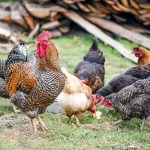Egg-eating behavior in hens is a complex issue with multiple potential causes. Understanding these causes is essential for effective prevention and management. Common reasons for this behavior include:
1.
Nutritional deficiencies: Hens require a balanced diet rich in calcium, protein, and vitamins to support egg production. When these nutrients are lacking, hens may consume their own eggs to compensate. 2.
Inadequate nesting environments: Uncomfortable or poorly designed nesting areas can lead to stress and egg-eating behavior. 3. Stress and boredom: Overcrowding, lack of stimulation, or other environmental stressors can contribute to this problem.
4. Natural cleaning instinct: Hens may attempt to remove broken eggs from their nests, leading to accidental consumption. 5.
Dehydration: Insufficient access to fresh water can exacerbate egg-eating behavior. To address these issues, farmers and poultry keepers should:
1. Provide a nutritionally balanced diet specifically formulated for laying hens.
2. Ensure constant access to clean, fresh water. 3.
Create comfortable and secure nesting areas. 4. Implement stress-reduction strategies and provide environmental enrichment.
5. Regularly collect eggs to minimize opportunities for egg-eating. By identifying and addressing the underlying causes, it is possible to significantly reduce or eliminate egg-eating behavior in hens.
Table of Contents
- 1 Providing Proper Nutrition
- 2 Creating a Comfortable Nesting Environment
- 3 Collecting Eggs Promptly
- 4 Using Fake Eggs as a Deterrent
- 5 Addressing Stress and Boredom
- 6 Seeking Professional Guidance
- 7 FAQs
- 7.1 What are some common reasons why chickens eat their own eggs?
- 7.2 How can I prevent chickens from eating their own eggs?
- 7.3 Are there any specific dietary changes I can make to prevent egg-eating behavior in chickens?
- 7.4 What are some signs that my chickens may be eating their own eggs?
- 7.5 Is egg-eating behavior harmful to chickens?
Key Takeaways
- Understanding the root of the problem is crucial for effectively addressing issues with egg-laying hens.
- Providing proper nutrition is essential for the health and productivity of egg-laying hens.
- Creating a comfortable nesting environment can encourage hens to lay eggs in the designated area.
- Collecting eggs promptly can prevent hens from re-eating their eggs and developing a habit of egg-eating.
- Using fake eggs as a deterrent can help discourage hens from pecking and eating their own eggs.
- Addressing stress and boredom in hens is important for preventing egg-eating behavior.
- Seeking professional guidance can provide valuable insights and solutions for managing egg-eating behavior in hens.
Providing Proper Nutrition
Supporting Strong Eggshells
In addition to a balanced diet, supplementing with calcium-rich foods such as oyster shells can help support strong eggshells and reduce the likelihood of hens eating their own eggs.
Hydration is Crucial
Ensuring hens have access to fresh, clean water at all times is vital. Dehydration can contribute to egg-eating behavior, so it is crucial to regularly check water sources and clean and refill them as needed.
A Healthy and Happy Flock
By prioritizing proper nutrition and hydration for your hens, you can help prevent egg-eating behavior and support their overall health and well-being.
Creating a Comfortable Nesting Environment

Another important factor in preventing hens from eating their own eggs is creating a comfortable nesting environment. Hens require a quiet, dark, and secluded space to lay their eggs comfortably. If the nesting boxes are overcrowded, dirty, or uncomfortable, hens may be more inclined to eat their eggs as a way to clean up their surroundings or due to stress from inadequate nesting conditions.
By providing clean and comfortable nesting boxes with plenty of bedding material, you can help encourage hens to lay their eggs in a safe and secure environment, reducing the likelihood of egg-eating behavior. It is also important to regularly clean and maintain the nesting boxes to ensure they remain a comfortable and inviting space for your hens. Remove any soiled bedding and replace it with fresh material on a regular basis to keep the nesting boxes clean and hygienic.
Additionally, consider adding curtains or dividers to create a more private and secluded space for your hens to lay their eggs. By prioritizing the comfort and cleanliness of the nesting environment, you can help prevent egg-eating behavior and support healthy egg production.
Collecting Eggs Promptly
One effective way to prevent hens from eating their own eggs is to collect them promptly after they are laid. Leaving eggs in the nesting boxes for an extended period of time can increase the likelihood of hens pecking at and consuming their own eggs. By collecting eggs promptly after they are laid, you can reduce the opportunity for hens to engage in this behavior and help maintain the integrity of the eggs for consumption or sale.
It is important to establish a regular routine for collecting eggs throughout the day to ensure they are not left unattended for too long. Consider checking the nesting boxes in the morning and again in the afternoon to collect any newly laid eggs. By staying on top of egg collection, you can minimize the risk of hens eating their own eggs and promote a healthy and productive laying environment for your flock.
Using Fake Eggs as a Deterrent
Another effective strategy for preventing hens from eating their own eggs is to use fake eggs as a deterrent. Placing fake eggs in the nesting boxes can help discourage hens from pecking at and consuming their own eggs by creating the illusion that the eggs are unappealing or undesirable. Fake eggs can be made from materials such as wood, plastic, or ceramic and should closely resemble real eggs in size, shape, and color.
By strategically placing fake eggs in the nesting boxes, you can help train hens to avoid pecking at their own eggs by associating them with an unpleasant experience. Additionally, fake eggs can help protect real eggs from damage during the laying process by providing a cushioned surface for hens to lay their eggs against. By incorporating fake eggs into your nesting boxes, you can help deter egg-eating behavior and support healthy egg production within your flock.
Addressing Stress and Boredom

Environmental Enrichment
To address stress and boredom in your flock, consider providing environmental enrichment such as perches, dust baths, and toys to keep your hens active and engaged.
Space and Movement
Additionally, ensure that your flock has access to plenty of space to move around and explore, as overcrowding can contribute to stress and boredom.
Preventing Egg-Eating Behavior
By addressing these underlying factors, you can help prevent egg-eating behavior and promote a healthy and contented flock.
Seeking Professional Guidance
If you have tried various strategies to prevent hens from eating their own eggs without success, it may be beneficial to seek professional guidance from a veterinarian or poultry expert. A professional can help assess your flock’s specific needs and provide tailored recommendations for addressing egg-eating behavior based on your unique circumstances. They can also conduct thorough health checks to rule out any underlying medical conditions that may be contributing to this behavior.
Additionally, a professional can offer valuable insights into best practices for managing your flock and preventing egg-eating behavior in the long term. By seeking professional guidance, you can gain access to expert knowledge and support that can help you effectively address this issue and promote a healthy and productive environment for your hens. In conclusion, addressing egg-eating behavior in hens requires a multifaceted approach that considers various factors such as nutrition, nesting environments, egg collection practices, deterrents, stress, and boredom.
By understanding the root of the problem and implementing targeted strategies, you can help prevent hens from eating their own eggs and support healthy egg production within your flock. If you continue to experience challenges with egg-eating behavior despite your best efforts, seeking professional guidance can provide valuable support and insights for effectively managing this issue.
If you’re looking for ways to keep your chickens from eating their own eggs, you may also be interested in learning how to insulate a chicken coop. Insulating your coop can help regulate the temperature and create a more comfortable environment for your chickens, which can in turn reduce stress and prevent egg-eating behavior. Check out this helpful article on how to insulate a chicken coop for more information.
FAQs
What are some common reasons why chickens eat their own eggs?
Chickens may eat their own eggs due to nutritional deficiencies, boredom, overcrowding, or as a result of learning the behavior from other chickens.
How can I prevent chickens from eating their own eggs?
To prevent chickens from eating their own eggs, you can provide a balanced diet, ensure they have enough space and entertainment, collect eggs frequently, and use fake eggs or nesting boxes designed to prevent egg breakage.
Are there any specific dietary changes I can make to prevent egg-eating behavior in chickens?
You can ensure that your chickens have access to a balanced diet that includes sufficient calcium, protein, and other essential nutrients to reduce the likelihood of egg-eating behavior.
What are some signs that my chickens may be eating their own eggs?
Signs that your chickens may be eating their own eggs include finding broken or missing eggs in the nesting boxes, egg yolk on their beaks or feathers, or a sudden decrease in the number of eggs being laid.
Is egg-eating behavior harmful to chickens?
Egg-eating behavior can be harmful to chickens as it can lead to nutritional deficiencies, reduced egg production, and potential health issues. It can also be a difficult behavior to break once it becomes a habit.
Meet Walter, the feathered-friend fanatic of Florida! Nestled in the sunshine state, Walter struts through life with his feathered companions, clucking his way to happiness. With a coop that’s fancier than a five-star hotel, he’s the Don Juan of the chicken world. When he’s not teaching his hens to do the cha-cha, you’ll find him in a heated debate with his prized rooster, Sir Clucks-a-Lot. Walter’s poultry passion is no yolk; he’s the sunny-side-up guy you never knew you needed in your flock of friends!







